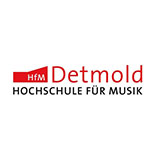Introduction to Detmold University of Music
Detmold University of Music is a public non-profit higher music institution located in Detmold, North Rhine-Westphalia, Germany, providing students with comprehensive music education from preparatory to doctoral degrees.
Overview
Student size: The school is small, with a student population ranging from 500-999, with a total of 765 students.
Faculty: With 54 academic staff, the faculty is professional and experienced, able to provide students with high-quality music education and guidance.
History and establishment time
The school was founded in 1946 and has a history of 78 years. It is one of the oldest and most reputable music schools in Germany.
School strength
Course settings: It offers bachelor's, master's and doctoral degree programs in multiple fields such as musicology, music education, composition, and performance, covering art education, church music, chamber music and song accompaniment, choral and orchestral conducting, opera singing, song singing, oratorio singing, music education / 39 learning courses including music management, basic music education, instrumental and vocal teaching methods, composition, recording production, music theory and ear training.
Teaching mode: Focus on practical teaching. Students have the opportunity to participate in a large number of performances and practical activities. The school holds about 300 concerts every year, providing students with rich stage experience and practical opportunities, which helps to improve students' professional skills and artistic expression.
Institutional nature
Public non-profit higher education institution.
Educational philosophy
Committed to cultivating students' musical talents and artistic literacy, focusing on tapping students' personal potential, providing personalized artistic training for students from the first semester of enrollment. Whether as a soloist, chamber musician or orchestral performer, they can be fully developed here. At the same time, it also attaches importance to the dissemination of the social value of music education.
Key laboratories and disciplines
Key disciplines: Music performance, music education, composition, musicology, etc. are the key disciplines of the school, with high teaching and research levels in vocal music, instrumental music performance, music creation, music theory research, etc.
Key laboratories: The school's Erich-Thien-Haus-Institut It is one of its important teaching and research institutions, focusing on teaching and practice in the fields of recording engineering, etc. Students can learn advanced recording technology and audio processing knowledge here, and work closely with teachers and students of music performance majors to achieve an organic combination of music creation and production.
Department
The school does not clearly divide the departments, but from the perspective of professional settings, it can be roughly divided into the Department of Music Performance, the Department of Music Education, the Department of Composition and Theory, etc. Each department focuses on different professional fields and jointly builds the school's professional system in music education.
Rankings
Ranked 4502 out of 14,160 universities worldwide, 1209 out of 2789 universities in Europe, 175 out of 370 universities in Germany, and 33 out of 65 universities in North Rhine-Westphalia.
In 2024, the ranking is 247th in Germany and 4442nd in the world.
Expenses
Tuition fees: German public universities are usually free of tuition fees for domestic students and some qualified international students, but they are required to pay certain semester miscellaneous fees. The school's miscellaneous fees per semester are about 310 euros, or about 1,000 dollars per year. The specific fees may vary depending on the major and course.
Living expenses: In Detmold, students' monthly living expenses are about 900 euros, of which accommodation costs are about 250-300 euros/month.
Campus
Campus location: The main campus is located at Neustadt 22 in Detmold, North Rhine-Westphalia, Germany, with a strong cultural and artistic atmosphere around it.
Teaching facilities: The school has professional music teaching facilities, such as concert halls, rehearsal rooms, recording studios, etc., which provide students with a good learning and practice environment. In addition, the school also has a library with a rich collection of books covering multiple fields such as music theory, music history, and art aesthetics to meet students' learning and research needs.
Living facilities: There are student dormitories and a variety of accommodation options around the campus to meet the different needs of students. At the same time, the city's rich cultural venues such as museums, theaters, and cinemas provide students with opportunities for extracurricular learning and entertainment, promoting the all-round development of students.
-

Heidelberg University
-

University of Freiburg
-

University of Jena
-

University of Marburg
-

University of Rostock
-

University of Halle-Wittenberg
-

University of Bayreuth
-

Leipzig University
-

University of Tübingen
-

Humboldt University of Berlin
-

Mesoamerican University
-

Istmo University
-

Mariano Galvez University of Guatemala
-

Regional University of Guatemala
-

Galileo University
-

Francisco Marroquín University
-

Rafael Landívar University
-

University of the Valley of Guatemala
-

University of San Carlos of Guatemala
-

Technological Institute of Tlaxcala Plateau
-

Golfo University
-

Technological University of South Sonora
-

Technological University of Huejotzingo
-

Tizimín Institute of Technology
-

Chilpancingo Institute of Technology

